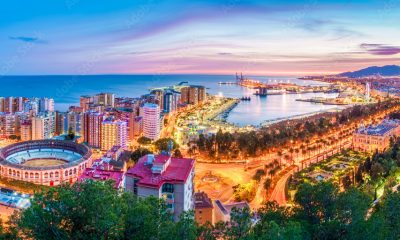Legal Requirements & Documentation
VISA and Work Permit

Obtaining a visa and a work permit in Spain can be a somewhat complex process, but it’essential if you plan to work legally in the country.
Here are the general steps you need to follow:
Determine Your Visa Type:
First, determine the type of visa you need.
For working in Spain, you typically need a work visa (visado de trabajo) or a work and residence permit.
Find a Job:
Before applying for a work visa, you’ll generally need to secure a job in Spain.
Many employers may help you with the visa application process.
Gather Required Documents:
Compile the necessary documents, which may include:
A valid passport with at least six months of validity beyond your planned stay in Spain.
A completed visa application form.
Proof of employment or a job offer from a Spanish employer.
Proof of no criminal record.
Proof of adequate financial means to support yourself in Spain.
Health insurance coverage.
Passport-sized photos.
Visa application fee payment.
Schedule an Appointment:
You’ll need to schedule an appointment with the Spanish consulate or embassy in your
home country to submit your visa application.
Check the specific requirements and procedures of the consulate where you’ll apply.
Attend the Visa Interview:
Attend your scheduled visa interview, where you’ll submit your application and provide any additional documents requested.
Be prepared to explain your reasons for wanting to work in Spain.
Pay the Visa Fee:
Pay the required visa fee at the time of your appointment.
Fees can vary depending on your nationality and visa type.
Wait for Processing:
Visa processing times can vary, so be prepared for potential delays.
You may need to wait several weeks or even months for a decision.
Receive Your Visa:
If your visa application is approved, you’ll receive a visa sticker in your passport.
Enter Spain:
Once you have your visa, you can travel to Spain.
You will typically need to enter the country within a certain timeframe specified on your visa.
Apply for a Work and Residence Permit:
After arriving in Spain, you must apply for a work and residence permit within the first 30 days of your stay. Your employer may assist with this process
Complete Formalities:
You may be required to undergo a medical examination and apply for a foreigner’s identification number (NIE).
Start Working:
Once you have your work and residence permit, you can legally start working in Spain.
Please note that visa and work permit requirements can change, so it’s essential to check the latest information on the official website of the Spanish embassy or consulate in your country
and consult with your employer for specific guidance.
Additionally, it may be helpful to seek legal advice or assistance from immigration experts to navigate the process successfully.
Fill out the form and get a offer
Banking & Finances
How to handle Spanish tax audits and inspections as a foreigner

Published: August 2025
Navigating the Spanish tax system can be challenging for expats, especially when facing a tax audit or inspection. Understanding your rights, obligations, and the process is key to avoiding stress and costly mistakes. Here’s a practical guide for foreigners in Spain on how to handle tax audits and what to expect if the Spanish tax authorities (Agencia Tributaria) come knocking.
Why you might be audited in Spain
Spanish tax authorities select cases for audit based on random checks, discrepancies in your tax return, high-value transactions, or information from other countries. Common triggers include unreported income, sudden changes in declared assets, or inconsistencies with bank data.
The audit process explained
- Notification: You’ll receive an official letter (“requerimiento”) by post or via your digital mailbox (Agencia Tributaria).
- Document request: You must provide supporting documents (bank statements, contracts, invoices, proof of residence, etc.) within the deadline stated.
- Meeting or inspection: Sometimes you’ll be invited for an interview or an inspector may visit your home or business.
- Resolution: The authorities will issue a decision—either closing the case or making an adjustment (which may include fines or back taxes).
- Appeal: You have the right to appeal decisions through administrative or legal channels.
Key tips for expats facing a tax audit
- Keep all tax-related documents for at least 4-5 years.
- Respond promptly and politely to any official requests.
- Use a registered tax advisor if you’re unsure—many specialize in expat cases.
- Don’t ignore letters from Agencia Tributaria, even if you’re abroad.
- Be honest—deliberate fraud is punished severely in Spain.
Common documents you might need
- Bank statements and account summaries (Spanish and foreign)
- Employment contracts or freelance invoices
- Proof of residency (empadronamiento, rental contracts, utility bills)
- Declarations of overseas assets (Modelo 720)
- Receipts for deductible expens
FAQ: Spanish tax audits and inspections
How will I know if I’m being audited? You’ll receive an official notification by post or digitally from Agencia Tributaria. Do I need to speak Spanish to handle an audit? It helps, but you can use a certified advisor or translator if needed. How long does a tax audit take? Most audits are resolved within a few months, but complex cases can take longer. What happens if I ignore the audit? Ignoring official requests can lead to fines, asset freezes, or legal action. Can I appeal a tax decision? Yes, you have the right to appeal administratively or through the courts. Are foreigners targeted more than locals? Not specifically, but expats with foreign income or assets may get extra scrutiny. What is Modelo 720? It’s a declaration of overseas assets, required for residents with more than €50,000 abroad. Do I need a lawyer for a tax audit? Not always, but complex cases or appeals benefit from professional help. What documents should I keep? All tax returns, bank statements, contracts, and proof of residency for at least 4-5 years. Can I get help in English? Many tax advisors in Spain speak English and are experienced with expat cases.
Disclaimer: This article is for informational purposes only. Always consult a professional for specific tax advice.
Legal Requirements & Documentation
Driving in Spain in 2025: Updated rules for EU and non-EU license holders

Published: August 2025
If you’re moving to Spain or already living here as an expat, understanding the latest rules for driving licenses is essential. In 2025, Spain follows EU-wide harmonization, making it easier for most EU/EEA citizens to drive legally without unnecessary bureaucracy. However, there are still important differences depending on where your license was issued. Here’s what you need to know about using your driving license in Spain as a foreign resident.
EU/EØS driving licenses: No mandatory exchange
If you hold a valid driving license from another EU or EEA country, you can legally drive in Spain without exchanging your license. There is no general requirement to swap your EU license for a Spanish one simply because you become resident.
- Validity: Your EU/EEA license is valid as long as it is up to date and not suspended or revoked in your home country.
- Renewal: If your license expires while you are resident in Spain, you must renew it with the Spanish authorities (DGT). You will then receive a Spanish license.
- Unlimited Validity: If your EU license is issued with unlimited validity, you must exchange it for a Spanish one after 2 years of residence.
- Traffic Offenses: Spanish authorities may require you to exchange your license if you commit certain offenses or if your license is lost or stolen.
- Voluntary Exchange: You can choose to exchange your EU/EEA license for a Spanish one at any time if you prefer.
UK and non-EU Licenses: what applies in 2025?
For UK citizens, post-Brexit agreements mean you can now exchange your UK license for a Spanish one without taking a driving test, provided it’s valid and you apply within the legal timeframe after becoming resident. For other non-EU countries, the rules depend on bilateral agreements:
- Countries with Agreements: Citizens from countries with a bilateral agreement (e.g. UK, Switzerland, Japan, South Korea) can exchange their license for a Spanish one without a test, within 6 months of obtaining residency.
- Countries without Agreements: If your country does not have an agreement with Spain (e.g. USA, Canada, Australia), you must obtain a Spanish license by passing both the theory and practical driving tests in Spain.
- 6-Month Rule: Non-EU licenses are only valid for 6 months after you become resident. After that, you must either exchange (if possible) or obtain a Spanish license.
How to exchange your license (If required)
- Check Eligibility: See if your country has an agreement with Spain on the DGT website.
- Book Appointment: Schedule an appointment at your local DGT office (Jefatura Provincial de Tráfico).
- Prepare Documents:
- Valid passport and NIE
- Proof of residency (empadronamiento)
- Your original driving license
- Recent passport photo
- Medical fitness certificate (psicotécnico)
- Completed application form and proof of payment
- Process: The DGT will keep your original license and issue a Spanish one, usually within 1–2 months.
Special cases & practical tips
- Always carry your driving license, passport/NIE, and proof of insurance when driving in Spain.
- If your license is not in Spanish, it’s recommended to have an official translation or International Driving Permit (IDP) for short stays.
- Never drive with an expired license – renew it promptly to avoid fines.
- For rental cars, EU/EEA licenses are always accepted; non-EU licenses may require an IDP.
- Stay updated with the latest rules on the DGT website.
FAQ
Do I need to exchange my EU license just because I move to Spain?
No, as long as it’s valid and not unlimited. You only need to exchange if it expires, is lost, or is issued with unlimited validity (after 2 years).
What if my country doesn’t have an agreement with Spain?
You’ll need to pass the Spanish driving theory and practical tests to get a Spanish license.
Can I voluntarily exchange my EU license for a Spanish one? Yes,
you can apply for an exchange at any time if you prefer a Spanish license.
What about UK licenses post-Brexit?
UK licenses can be exchanged for Spanish ones without a test, if you apply within the legal timeframe after residency.
Disclaimer: This article is for informational purposes only and does not constitute legal advice. Always check with the DGT or your local traffic authority for the latest updates.
Legal Requirements & Documentation
Spain’s Digital Nomad Visa in 2025: Comprehensive guide

Published: August 2025
Spain has become one of Europe’s most attractive destinations for remote workers and digital nomads. With its sunny climate, vibrant cities, and excellent infrastructure, the country launched its Digital Nomad Visa program to attract international talent. In 2025, several new updates have been introduced, making it even easier and more beneficial for foreign professionals to live and work remotely from Spain. This article provides a comprehensive overview, including eligibility, application steps, tax implications, and practical tips for a smooth relocation.
What is the Digital Nomad Visa?
The Digital Nomad Visa allows non-EU nationals to legally live and work remotely from Spain for up to three years, with possible extensions. It’s designed for freelancers, entrepreneurs, and remote employees working for companies outside Spain. The visa grants access to a wide range of public services and makes it possible to bring close family members.
Key updates for 2025
- Longer Stay: The initial visa is now valid for three years, with an option to renew for two more years, allowing up to five years of residence.
- Lower Income Threshold: The minimum monthly income required has been reduced to €2,400, making the visa accessible to a broader group of remote workers.
- Family Inclusion: Immediate family (spouse/partner and dependent children) can be included in the application with simplified documentation.
- Faster Processing: Average processing time is now 30 days, thanks to digitalized applications and dedicated government teams.
- Tax Incentives: Digital nomads benefit from a special tax regime, with reduced tax rates for the first five years of residency.
- Remote Application: Applications can now be started and processed from outside Spain, making relocation planning much easier.
Eligibility criteria
- Non-EU/EEA/Swiss citizenship
- Proof of remote work (employment contract, freelance agreements, or business ownership)
- Minimum monthly income of €2,400 (can be combined family income if applying with dependents)
- Comprehensive health insurance valid in Spain
- Clean criminal record from both home country and Spain
- Proof of accommodation in Spain (rental agreement or property ownership)
Step-by-step application process
- Gather documentation:
- Valid passport
- Proof of employment or freelance contracts
- Bank statements or pay slips showing required income
- Health insurance policy
- Criminal record certificate (apostilled and translated if necessary)
- Proof of accommodation in Spain
- Marriage/birth certificates if applying with family
- Submit application online:
- Visit the official Spanish immigration portal and create an account.
- Upload all required documents and complete the application form.
- Pay the application fee online.
- Attend biometric appointment:
- Schedule and attend a biometric appointment at your nearest Spanish consulate or in Spain after arrival.
- Receive approval:
- Once approved, collect your Digital Nomad Visa and residence card.
- Register locally:
- Upon arrival, register your address at the local town hall (empadronamiento) and with the local police station.
Taxation for Digital Nomads in Spain
Digital nomads benefit from a special tax regime (Beckham Law), which allows them to pay a flat tax rate of 24% on income up to €600,000 for the first five years. This is a significant advantage compared to standard progressive tax rates. However, you must not have been a Spanish tax resident in the previous five years to qualify.
- Income earned from abroad is usually not double-taxed if Spain has a tax treaty with your home country.
- Rental income, capital gains, and other Spanish-sourced income are taxed separately.
- It is strongly advised to consult a Spanish tax advisor to optimize your tax situation.
Living in Spain as a Digital Nomad
Spain offers a high standard of living, excellent internet connectivity, and a welcoming expat community. Major cities like Barcelona, Madrid, Valencia, and Malaga are popular among digital nomads for their coworking spaces, international networking events, and vibrant lifestyle. Many smaller towns and coastal areas are also investing in digital infrastructure to attract remote workers seeking a quieter environment.
Cost of living
The cost of living varies by region but is generally lower than in many Western European countries. Expect affordable groceries, public transport, and healthcare, but be prepared for higher prices in city centers and tourist hotspots.
Finding accommodation
- Short-term rentals are widely available on platforms like Idealista, Fotocasa, and Airbnb.
- Long-term leases may require proof of income, a Spanish bank account, and a deposit (usually one or two months’ rent).
- Consider joining local expat forums and social media groups for rental leads and advice.
Common challenges and how to overcome them
- Language Barrier: While many Spaniards speak English, especially in cities, official paperwork is usually in Spanish. Consider taking basic Spanish lessons or hiring a gestor (local admin assistant).
- Bureaucracy: Spanish bureaucracy can be slow. Always keep copies of all documents, and follow up regularly on your application status.
- Healthcare: Private health insurance is mandatory for the visa, but once registered as a resident, you may access the public healthcare system.
- Networking: Join coworking spaces, expat meetups, and professional groups to build your network and find support.
Frequently asked questions
Can I apply for the Digital Nomad Visa if I’m already in Spain?
Yes, you can apply from within Spain or from your home country.
The process is now fully digitalized for both options.
Can I bring my family with me?
Yes, immediate family members can be included in your application under simplified rules introduced in 2025.
Do I need to pay taxes in Spain?
Yes, but you may benefit from a special tax regime for digital nomads.
Consult a tax advisor for your specific situation.
FAQ
Frequently Asked Questions – Digital Nomad Visa Spain
Disclaimer: This article is for informational purposes only and does not constitute legal or tax advice. Always consult with a professional for your specific situation.


































































